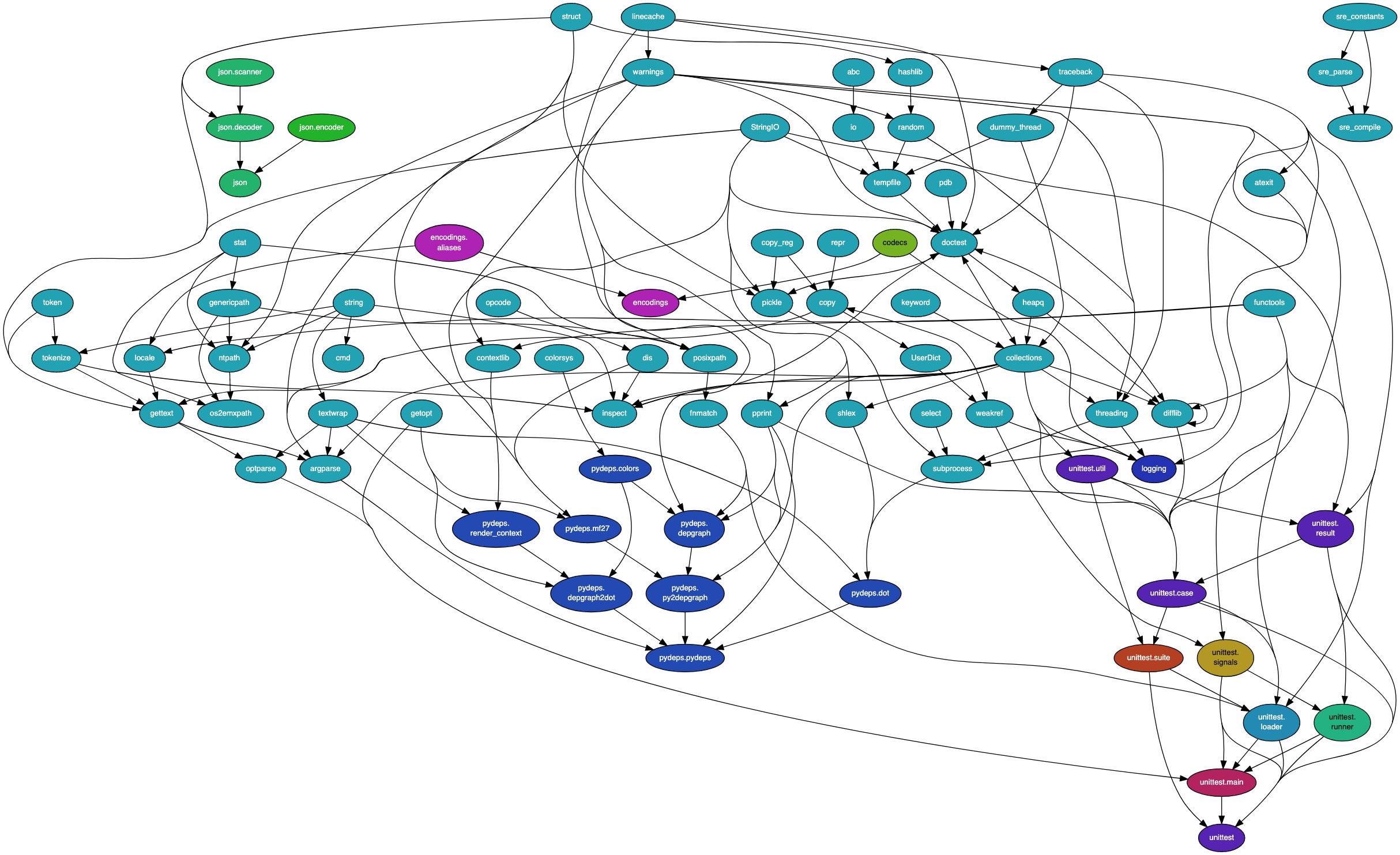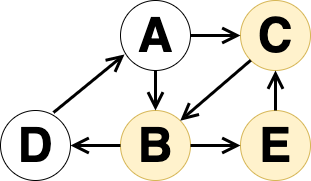 我在傍晚醒来,决定了-这是所有时间,现在是时候在我的图书馆中制作一个新功能了。并检查图表以修复和加快周期。到早上午餐时,我做了一个新功能,改进了代码,以方便的形式制作了图形表示形式,并遇到了在图形中查找所有简单循环的问题。我ing着一杯冷水,打开Google,输入“在图中搜索所有简单的循环”,然后看到...
我在傍晚醒来,决定了-这是所有时间,现在是时候在我的图书馆中制作一个新功能了。并检查图表以修复和加快周期。到早上午餐时,我做了一个新功能,改进了代码,以方便的形式制作了图形表示形式,并遇到了在图形中查找所有简单循环的问题。我ing着一杯冷水,打开Google,输入“在图中搜索所有简单的循环”,然后看到...
我没看到什么……虽然只有凌晨四点。指向算法link1,link2的几个链接,以及许多提示,该睡觉了图中可能有很多循环,通常情况下问题无法解决。关于这个话题的另一个问题是关于哈布雷的问题,这个问题的答案也没有挽救我- 我已经知道了深入的搜索。
但是,一旦我解决了问题,那么即使NP也会解决P中的一个难题,我喝的水会更多,而不是咖啡,而且水也不会突然结束。而且我知道,在我的任务框架内,应该有可能在短时间内找到所有循环,而无需超级计算机-对我而言不是数量级。
让我们脱离侦探,了解我为什么需要它。
这是什么图书馆?
名为DITranquility的库是用Swift编写的,其任务是注入依赖项。该库以爆炸式的方式处理依赖项注入的任务,具有其他Swift库无法做到的功能,并且速度很快。
但是,为什么我要养成在依赖关系图中检查循环的习惯?
为了杀手f-如果该库以爆炸的形式完成主要功能,那么您正在寻找改进和改进它的方法。一个主要的功能是检查依赖关系图的正确性-它是一组不同的检查,可让您避免在运行时出现问题,从而节省了开发时间。周期检查在所有检查中都脱颖而出,因为此操作需要更长的时间。直到最近,还没有文明的时间。
, , , . , "Graph API" . "Graph API" — , :
- - . , , , .
- , - — graphvis.
- .
— , ...

, :
- MacBook pro 2019, 2,6 GHz 6-Core i7, 32 Gb, Xcode 11.4, Swift 5.2
- Swift 300+ ( )
- 900
- 2000
- 40
- 7000
debug , release, debug.
, 95 .
3 , .
1.
. , .
, . Graph API , , . . , , , .
, , — . , , , :
- — , .
- — ,
- —
, , , . , — , . — ?
, - :
Graph:
vertices: [Vertex]
adjacencyList: [[Edge]]
Vertex:
more information about vertex
Edge:
toIndices: [Int]
information about edge Vertex , Edge , , .
, . , , , , .
2.
, 4 , , , , , — " , , ". :
func findAllCycles() -> [Cycle] {
result: [Cycle] = []
for index in vertices {
result += findCycles(from: index)
}
return result
}
func findCycles(from index: Int) -> [Cycle] {
result: [Cycle] = []
dfs(startIndex: index, currentIndex: index, visitedIndices: [], result: &result)
return result
}
func dfs(startIndex: Int,
currentIndex: Int,
// visitedIndices
visitedIndices: Set<Int>,
// result -
result: ref [Cycle]) {
if currentIndex == startIndex && !visitedIndices.isEmpty {
result.append(cycle)
return
}
if visitedIndices.contains(currentIndex) {
return
}
visitedIndices += [currentIndex]
for toIndex in adjacencyList[currentIndex] {
dfs(startIndex: startIndex, currentIndex: toIndex, visitedIndices: visitedIndices, result: &result)
}
}, 10 … , , — - ...
, — ? , ? , dfs , 30 . 900 * 1000000 = 900.000.000 dfs…
? , , … ZZzzz...
3.
, , , , , - … , , , !
, , , , . — , , . , , , - :
func findAllCycles() -> [Cycle] {
globalVisitedIndices: Set<Int> = []
result: [Cycle] = []
for index in vertices {
if globalVisitedIndices.containts(index) {
continue
}
result += findCycles(from: index, globalVisitedIndices: &globalVisitedIndices)
}
return result
}
func findCycles(from index: Int, globalVisitedIndices: ref Set<Int>) -> [Cycle] {
result: [Cycle] = []
dfs(currentIndex: index, visitedIndices: [], globalVisitedIndices, &globalVisitedIndices, result: &result)
return result
}
func dfs(currentIndex: Int,
// visitedIndices
visitedIndices: Set<Int>,
// globalVisitedIndices -
globalVisitedIndices: ref Set<Int>,
// result -
result: ref [Cycle]) {
if visitedIndices.contains(currentIndex) {
// visitedIndices , ,
result.append(cycle)
return
}
visitedIndices += [currentIndex]
for toIndex in adjacencyList[currentIndex] {
dfs(currentIndex: toIndex, visitedIndices: visitedIndices, globalVisitedIndices: &globalVisitedIndices, result: &result)
}
}" , " … . 10 , , , , :
- , , , .
- "" — , .
, . , , .
4.
, . , , , , , , . , ? . , , run… , — , … , … … , . :
if visitedIndices.contains(currentIndex) {, , . :

B->E->C , if . , :
A->B->E->C->B!.. C, . A->B->D->A.
A->C->B->D->A , C .
, dfs , .
5.
, . , , , dfs 30 , 1-2 . :

"Big" - , A.
! Big C, , A B, , C , , A.
? , , , . . O(N^2) , .
, :
func findAllCycles() -> [Cycle] {
reachableIndices: [Set<Int>] = findAllReachableIndices()
result: [Cycle] = []
for index in vertices {
result += findCycles(from: index, reachableIndices: &reachableIndices)
}
return result
}
func findAllReachableIndices() -> [Set<Int>] {
reachableIndices: [Set<Int>] = []
for index in vertices {
reachableIndices[index] = findAllReachableIndices(for: index)
}
return reachableIndices
}
func findAllReachableIndices(for startIndex: Int) -> Set<Int> {
visited: Set<Int> = []
stack: [Int] = [startIndex]
while fromIndex = stack.popFirst() {
visited.insert(fromIndex)
for toIndex in adjacencyList[fromIndex] {
if !visited.contains(toIndex) {
stack.append(toIndex)
}
}
}
return visited
}
func findCycles(from index: Int, reachableIndices: ref [Set<Int>]) -> [Cycle] {
result: [Cycle] = []
dfs(startIndex: index, currentIndex: index, visitedIndices: [], reachableIndices: &reachableIndices, result: &result)
return result
}
func dfs(startIndex: Int,
currentIndex: Int,
visitedIndices: Set<Int>,
reachableIndices: ref [Set<Int>],
result: ref [Cycle]) {
if currentIndex == startIndex && !visitedIndices.isEmpty {
result.append(cycle)
return
}
if visitedIndices.contains(currentIndex) {
return
}
if !reachableIndices[currentIndex].contains(startIndex) {
return
}
visitedIndices += [currentIndex]
for toIndex in adjacencyList[currentIndex] {
dfs(startIndex: startIndex, currentIndex: toIndex, visitedIndices: visitedIndices, result: &result)
}
}, , , 5 — . — 15 , 6-7 . , , , — .
6. ?
, , — - . , , - .
, , , .
— " , , , ?". . 5 .
, 250, , , :
func findAllCycles() -> [Cycle] {
reachableIndices: [Set<Int>] = findAllReachableIndices()
result: [Cycle] = []
for index in vertices {
result += findCycles(from: index, reachableIndices: &reachableIndices)
}
return result
}
func findAllReachableIndices() -> [Set<Int>] {
reachableIndices: [Set<Int>] = []
for index in vertices {
reachableIndices[index] = findAllReachableIndices(for: index)
}
return reachableIndices
}
func findAllReachableIndices(for startIndex: Int) -> Set<Int> {
visited: Set<Int> = []
stack: [Int] = [startIndex]
while fromIndex = stack.popFirst() {
visited.insert(fromIndex)
for toIndex in adjacencyList[fromIndex] {
if !visited.contains(toIndex) {
stack.append(toIndex)
}
}
}
return visited
}
func findCycles(from index: Int, reachableIndices: ref [Set<Int>]) -> [Cycle] {
result: [Cycle] = []
dfs(startIndex: index, currentIndex: index, visitedIndices: [], reachableIndices: &reachableIndices, result: &result)
return result
}
func dfs(startIndex: Int,
currentIndex: Int,
visitedIndices: Set<Int>,
reachableIndices: ref [Set<Int>],
result: ref [Cycle]) {
if currentIndex == startIndex && !visitedIndices.isEmpty {
result.append(cycle)
return
}
if visitedIndices.contains(currentIndex) {
return
}
if currentIndex < startIndex || !reachableIndices[currentIndex].contains(startIndex) {
return
}
visitedIndices += [currentIndex]
for toIndex in adjacencyList[currentIndex] {
dfs(startIndex: startIndex, currentIndex: toIndex, visitedIndices: visitedIndices, result: &result)
}
} : if currentIndex < startIndex.
, run, , — … 6 ? , … .
, , , . — , A, , A . A, .
, , /.
— , . 5-10% .
6.
5-6 , , ! . , Swift , .
, , 6 … , . — " ? ...". — . — , .
3 , , . , Apple , (, , ). Swift popLast(), . .
var visited: Set<Int> = []
var stack: [Int] = [startVertexIndex]
while let fromIndex = stack.first {
stack.removeFirst()
visited.insert(fromIndex)
for toIndex in graph.adjacencyList[fromIndex].flatMap({ $0.toIndices }) {
if !visited.contains(toIndex) {
stack.append(toIndex)
}
}
}
return visitedvar visited: Set<Int> = []
var stack: [Int] = [startVertexIndex]
while let fromIndex = stack.popLast() {
visited.insert(fromIndex)
for toIndex in graph.adjacencyList[fromIndex].flatMap({ $0.toIndices }) {
if !visited.contains(toIndex) {
stack.insert(toIndex, at: 0)
}
}
}
return visited, , — , Swift 5-10%.
? — 95 , 2.5-3 , .
, , — .
, , 15 , .
— , , , .
Swift .
, , , .
, "" -. , - :
- graphvis — .
- — , , , .
- , .
P.S. 5 , . , 1.5 — 4.5 . .
P.P.S. , . , , //.
UPD: . dot , .
.
UPD: banshchikov Donald B. Johnson. swift.
, .
:
| _ | ||
|---|---|---|
| (debug) | 2.4-2.5 | 36.2-44.5 |
| () | 0.25-0.33 | 32.1-36.4 |
| 6920* | 5736 | |
| * | 5736 | 5736 |
仅针对搜索循环测量时间。第三方库可将输入数据转换为方便的数据,但这种转换应不超过0.1秒。如您所见,时间相差一个数量级(释放时相差两个)。如此大的差异不能归因于非最佳实现。
- 如我所写,在库中,边不仅仅是从一个顶点到另一个顶点的过渡。此类信息无法传递给第三方实现,因此找到的循环数不匹配。因此,在结果中搜索沿顶点的所有唯一循环(不包括边),以确保结果匹配。